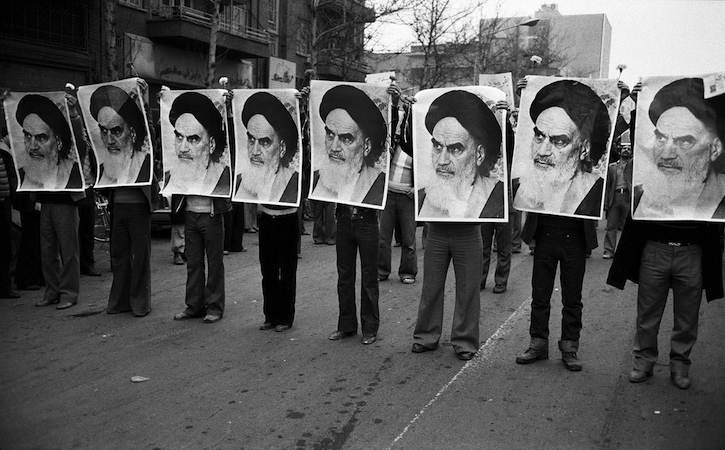US-Iran Relations: Lost Opportunities?

Center for Iranian Diaspora Studies, San Francisco State University proudly presents the second event in its new series, “Spotlight on US-Iran Relations,” featuring a round table discussion with San Francisco State University faculty members Dr. Mohammad Azadpour (Philosophy), Dr. Mohammad Monshipuri (International Relations), and Dr. Maziar Behrooz (History) to mark 40 years since the Iranian Revolution and the current crisis.
“Spotlight on US-Iran Relations” aims to bring experts and our local community together to address these anxiety-ridden times, fraught with concern about the effect of sanctions and military action on Iran and the situation of human rights in Iran.
This is a free event, but we ask that you register to attend by clicking on "Get Tickets".
About Dr. Mohammad Azadpour
Mohammad Azadpur is a Professor of Philosophy at San Francisco State University (2003-now). He received my Ph.D. in Philosophy from the University of Virginia in 1999, and was then awarded a Mellon Postdoctoral Fellowship at John Hopkins University (1999–2002). His work brings Islamic philosophers into dialogue with leading figures in contemporary philosophy. His latest book, Analytic Philosophy and Avicenna: Knowing the Unknown (Routledge, forthcoming), engages analytic neo-Hegelians (Wilfrid Sellars and John McDowell) and Islamic Peripatetics (mainly Avicenna) in rethinking foundationalism and intentionality. Another line of research explores the primacy of ethics in the activity of philosophy, from Ancient Greek philosophy to twentieth-century figures such as Martin Heidegger, Pierre Hadot, and Michel Foucault. His book in this area is titled Reason Unbound: On Spiritual Practice in Islamic Peripatetic Philosophy (SUNY Press, 2011), and was the subject of a 2012 American Philosophical Association Author-Meets-Critics session. Relevant articles have appeared in such books and journals as Islamic Philosophy and Occidental Phenomenology on the Perennial Issue of Microcosm and Macrocosm (Springer, 2006), New Nietzsche Studies (1999), The Classical Bulletin (2007), Comparative Philosophy (2012), Religious Inquiries (2015), and The Maghreb Review (2015, 2018). In addition to the above publications, he recently edited a collection of representative texts of canonical Islamic philosophers for a sourcebook that spans the various medieval traditions of philosophy. It is published under the title Medieval Philosophy: A Multi-Cultural Sourcebook (Bloomsbury, 2019).
About Dr. Mohammad Monshipuri
Mahmood Monshipouri is professor of International Relations. He received his Ph.D. from the University of Georgia in 1987. He has taught at the University of Georgia, Central Michigan University, Alma College, Quinnipiac University, Redlands University, and California State University at San Marcos. During 2003-2006, he served as a Visiting Fellow at the Yale Center for International and Area Studies.
He teaches several courses in international relations, including the Middle and North Africa in International Relations, the Persian Gulf in International Relations, Theory and Application in International Relations, and Introduction to World Affairs. He specializes in human rights, identity construction, and globalization in the Muslim world. He has published and edited many books, most recently Inside the Islamic Republic: Social Change in Post-Khomeini Iran (Oxford University Press, 2016); Information, Politics, Protest, and Human Rights in the Digital Age (Oxford University Press, 2016); Democratic Uprisings in the Middle East and North Africa: Youth, Technology, and Modernization (Paradigm Publishers, 2013); Terrorism, Security, and Human Rights: Harnessing the Rule of Law (Lynne Rienner Publishers, 2012); Human Rights in the Middle East: Frameworks, Goals, and Strategies (Palgrave Macmillan, 2011); Muslims in Global Politics: Identities, Interests, and Human Rights (University of Pennsylvania Press, 2009); Islam and Human Rights: Advocacy for Social Change in Local Contexts (New Delhi, India: Global Media Publications, 2006); and he co-edited Constructing Human Rights in the Age of Globalization (Armonk, NY: M. E. Sharpe, 2003).
His most recent articles have appeared in Human Rights Quarterly, Insight Turkey, and International Studies Journal. He has served as the President of the International Studies Association—Northeast Political Science Association, the Executive Director of the Center for Iranian Research and Analysis. He currently serves as an editor of the Muslim World Journal of Human Rights, Berkeley Electronic Press.
About Dr. Maziar Behrooz
Maziar Behrooz is an Associate Professor in the SF State History Department. He received his Ph.D. in History from University of California, Los Angleles. His areas of expertise include the Middle East, Islamic history, an Iran in the 19th century. He teaches a year long course on the History of the Islamic World, 500-present, as well as courses on Iran and Afghanistan. He has published on the Iranian Left and its role in the Iranian Revolution, and the history of Russian-Iranian relations. He is the author of Rebels With A Cause: The Failure of the Left in Iran and he often lectures on current events in Iran at public forums.